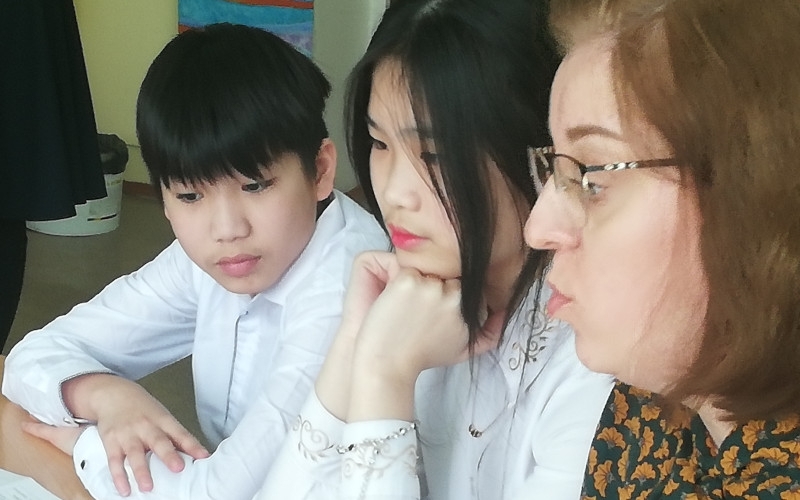
February 21 is International Mother Language Day. This holiday was established at the initiative of UNESCO in order to preserve and protect the linguistic and cultural heritage.
Online conference “Ethno-saving mission of native languages. “Russian language as a basis for the unity of peoples” is a continuation of the project “On the way of the AzBuka” which has been implemented by the “Idea” Foundation in the Polevsk urban district of the Sverdlovsk region since 2019. In 2021, the project received support from the Ministry of International and Foreign Economic Affairs of the Sverdlovsk Region, the Representative Office of the Ministry of Foreign Affairs in Yekaterinburg, the Eurasian Peoples’ Assembly, and the Assembly of peoples of Russia. "On the Way of the AzBuka" project helps to reveal the theme of preserving the Cyrillic alphabet as the basis of the Slavic languages, promotes the Russian language abroad as a language of interethnic communication, education and professional career.
Last December, when the project, supported by the Consulate General of the Kyrgyz Republic in Yekaterinburg, brought together educational institutions in Bishkek and Osh (Kyrgyzstan), Yekaterinburg and Polevskoy (Russia), there was emerged a trend that concerns teachers of the Russian language. On the territory of the Sverdlovsk region, migrants’ children, when getting into a new language environment adapt more easily if they are included in the social and cultural life of the school. But what should be the algorithm for teaching the Russian language, how to create conditions so that children do not lose touch with their native language, how to help them master the entire course with minimal losses and great gains?
The discussion was opened by Mikhail Samokhin, President of the Idea Foundation, Elena Karmanova, adviser to the mayor of Polevskoy, and Alena Kaeva, a teacher at the Secondary School No. 8.
The online conference made it possible to bring together speakers from different countries and cities, since the topic of teaching the Russian language for migrant children is accompanied by similar problems. That is why the experience of the “Derzhava” Lyceum from Obninsk (Russia) was so interesting. The Lyceum worked out a system of precise regulation of all the processes of education and adaptation of migrant children, their social and linguistic communications. According to the Minister of Internal Policy and Mass Communications of the Kaluga Region Oleg Kalugin, social and cultural adaptation and integration into Russian culture is based on the preservation of the national identity of children who come from abroad.
Irina Polyakova, Head of the Department for Cultural Cooperation of the Eurasian Peoples’ Assembly, noted that the preservation and development of the language is the task of each state, but today time dictates the active participation of the public in solving pressing issues of life, and the issue of the ethno-preserving mission of native languages is one of the most important of them. She cited UNESCO data that of the seven thousand languages of the world, about half are on the verge of extinction. However, the process of creating a multicultural unity based on multilingualism continues. This is confirmed by the fact that since 2022, under the auspices of UNESCO, the International Decade of the World's Indigenous Languages has started.
Elvira Kuklina, Chairman of the All-Russian Association of Ethno bloggers (Yoshkar-Ola, Russia), presented the unique experience of the ethno blogging school in the Republic of Mari El. Today, an increasing number of young people are joining this project because they want to talk about the culture of their peoples and the peculiarities of the territory of residence in their native language.
Alexander Stepanyuk, head of the Russian Cultural Center "Harmony" in Bishkek (Kyrgyzstan), noted the main trends in the need to preserve the Russian language in Kyrgyzstan. According to available statistics, the main country for labor migration of the Kyrgyz is Russia, so knowledge of the language gives them the opportunity to receive education, qualified and prestigious work.
Sufiya Tamindarova, chairman of the public organization "Urals Tatars" (Yekaterinburg, Russia), shared her rich experience in preserving the Tatar language and culture of the people.
The participants of the online meeting learned the amazing story of serving the Russian, Slavic culture by the family of Dushan and Elina Mikhailovich. For eight years in Chile they united around themselves migrants from Russia and the former republics of the USSR at the site of Rossotrudnichestvo. Elina is an Armenian, Dushan is a Serb, now they live and work in Yekaterinburg. The Russian language became the language of communication for their family, part of their professional activity and ministry - in Chile, Father Dusan Mikhailovich headed the Orthodox parish.
Alena Kaeva, a teacher at school No. 8 in Polevskoy (Russia), introduced the meeting participants to her students from Vietnam, who not only show success in comprehending the most difficult Russian language for them, but also read poetry well, draw - in a word, participate in cultural life schools.
Yekaterinburg writer Olga Belousova shared her thoughts on why the fairy tale is a universal genre for upbringing, education, and international interaction. It is planned that in 2022 Olga's fairy tale about the Ural Frost, created at the initiative of the Idea Foundation, will appear in 12 languages. It has already been translated into eight languages. The coloring book has already been printed in the Kyrgyz language; the drawings for it were created by pupils of the Children's Art School in the city of Polevskoy.
According to the participants of the meeting, the format of the conference made it possible not only to identify problems, to reveal them, but also to form a joint algorithm of actions to promote and teach the Russian language to adults and children around the world, as well as to identify practical tasks for preserving native languages as the basis of the identity of peoples.


